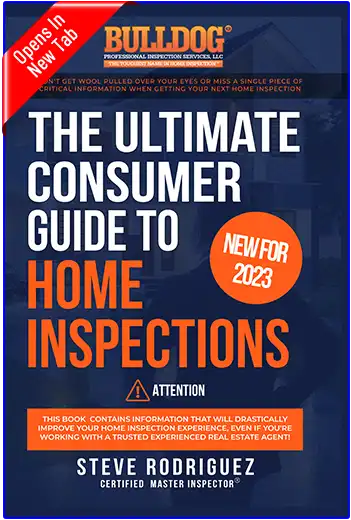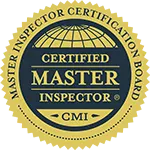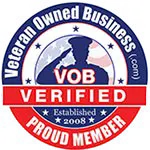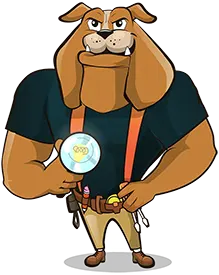KC’s Best Home Inspection Process – The MaxInspect™ System
Page Contents
Are you curious …
- WHAT Makes Kansas City Home Inspectors Different?
- WHY Are Home Inspection Prices Different?
- WHAT makes us one of Kansas City’s Best Home Inspection companies?
The MOST Complete Home Inspection Process in Kansas City
What does this mean?
Our home inspection process is designed for the way home inspections SHOULD be performed.
You see, I knew almost nothing about homes when I first got started back in 2003.
As I gained experience, I realized the home inspection process meant to protect home inspectors also creates most of the disappointment with homebuyers (and still does with other home inspection companies).
But a home inspection process is necessary because homes are dangerous.
There is real risk walking on a roof, getting into an attic, or opening a main electrical panel. Plus, different home inspectors have different skills and abilities while also walking into a broad range of homes made of different materials in various climates and conditions all over the world.
And while the average home inspection process keeps average home inspectors safe, they also scare home inspectors into giving you inferior results.
Which is pretty unacceptable because a home inspector only has one job – find the issues around a home then share them with you in ways you understand.
And if they’re handicapped by an outdated home inspection process, it’s only a matter of time before you get disappointed – or even worse, burned – by their mediocre home inspection process.
This is why some home buyers, real estate investors, and real estate agents even skip the home inspection or walk away feeling confused afterward.
It’s also why you should NOT hire a new, inexperienced (less than 5 years of full-time experience) or low-priced home inspector because their home inspection process taught them to:
- NOT move furniture
- NOT move personal items
- NOT move storage items
- IN FACT, try not to touch anything
Plus…
- Most DON’T have to walk on the roof
- Or REMOVE the electrical panel cover 🙈
- They only check HALF the windows
- And only check HALF the outlets
- They’re scared to use the word ”mold’
- They also WON’T tell you what caused the problems they find
The worst part? This is what you can expect from most home inspection companies.
To them, they’re just following the rules and doing nothing wrong, so you’ll still get charged top dollar for their silly and sad home inspection process that has a good chance of leaving you confused and frustrated later. 😲
And now comes the part where I tell you it doesn’t have to be that way 😉.
Because after the market crash of 2008, I scrapped the guidelines and started inspecting homes my way.
I call these series of techniques…
The MaxInspect™ Home Inspection Process
What’s The Difference?
The BEST home inspection process takes more than just a flashlight and a ladder.
And it takes more than knowing construction terms (like tieback), flipping switches, and a peeking inside the attic to get your hands on a quality home inspection process that WON’T make you want to pull your hair out after you move in.

It takes a home inspection process that anticipates the issues and knows which questions to ask – no matter the age, type, size, or location of the home.
And no two homes are the same.
For example, a new home is vastly different than a 50-year-old home.
And a 50-year-old home is vastly different than a historic home.

These homes were built differently, used different materials, and accommodated different lifestyles than homes of other eras.
Electric appliances weren’t common so electrical service size was usually much smaller than today.
Sewer lines were made from clay and cast iron that crack, break, and get clogged so plumbing issues are also a big concern.
Efficiency, consistency, and safety weren’t front and center, so insurance companies (and certain loan programs) also sometimes need proof that these areas – and others – are up to snuff before you get insured.
I’m sure you get the picture.
Now, plop this historic home in the country where updates are slow, repairs are sloppy, and building codes might not even exist, and suddenly you feel like you’re really back in the wild west.
And this is for just ONE house.
Switch it up from a basement to a crawlspace, throw in termites, add sewer line problems (or septic issues), mix in a little Radon gas, and hopefully you see what I mean.
That is why we created a home inspection process called The MaxInspect™ home inspection.
Here’s what goes into the most deliberate, detailed, and exhaustive Kansas City home inspection process designed to uncover maximum defects for maximum return on your investment while giving you minimum risk, loss, and confusion:
100% Inspection
This uncovers 85%-90% of the visible and readily available defects in and around a home.
While there are roughly 400 items the average home inspector must check, our 100% home inspection process checks an average of 2000 items in and around the home (depending on the home).
Our MaxInspect™ Home Inspection Process inspects:
- Landscaping (drainage, driveway, porch, deck, and patios)
- Roof (soffits, fascias, rake boards, ventilation, shingles (including number of layers), flashings, and chimneys2.
- Every window1
- Every toilet1
- Every light and ceiling fan1
- Every switch1
- Every outlet1
- All appliances (that stay with the home)
- Operation and testing of entire plumbing system (inside the home)
- Operation and testing of HVAC system4
- Run water through all faucets for entire inspection3
- Exterior (siding, outlets, windows, window wells, foundation, and retaining walls)
- Attic (insulation, ventilation, ductwork, electrical wiring, roof deck, and rafters)1
- Every door1
- Every ceiling (including stains and cracks)
- Every floor (for waviness and unevenness)
- Every air vent1
- Every garage (including firewalls and openers)
- Foundation (for movement, cracking, and water seepage)
- Testing and inspection of entire electrical system (inside and out)
In a nutshell, we will report on 100% of the items we can test, touch, see, smell, and hear – WITHOUT exception.
1Must be accessible
2Must be safe
3When the home is vacant
4Cooling system when outside temp. >65°F
Gravity Flow™ Process
Movement and moisture cause more damage than we see on the surface.
And because gravity is CONSTANTLY pulling things down, we follow these problems as far as we can to help you understand how far they spread and how concerned you should be.
That’s why our home inspection process checks your home from top to bottom. This lets us use the force us gravity to help us uncover the whole story by following cracks and stains down to the source or down as far as they go.
Mystery Glitch™ Technique
Sometimes finding problems is MORE like a riddle than a home inspection.
You know the quirks you sometimes find in a home? That’s a MYSTERY GLITCH.
We track, isolate, and reveal those random – and sometimes annoying – peculiarities that require a little more finesse to find because they’re HIDDEN from plain sight.
Things like:
- A hallway light that doesn’t work until another switch is flipped
- A ceiling fan that’s controlled in another room
- A shower leak that trips a circuit breaker
- A garbage disposal that turns on the microwave
You get the picture. And there are dozens of situations like this.
It takes years to learn which things go wrong, where it could be, and how to troubleshoot.
Every home is DIFFERENT, so knowing what to expect is impossible.
But that’s a skill we bring to your home inspection process.
10Key™ Comment Method
Finding the defects is only half the battle.
Once we find them, YOU need to understand WHERE it is and WHAT’S happening so you can make the right choice for yourself.
That’s why we answer 10 key questions about the defects we find:
- What happened?
- Where is it?
- What caused it?
- What will happen if it’s ignored?
- Any signs of past problems?
- Any signs of past repairs?
- Is it a major concern?
- What do I recommend?
- Has it affected anything else?
- Has it damaged any surrounding areas?
These are the 10 questions every report MUST answer if you hope to understand each defect and the impact it has on the home.
You’ll get them in plain English so they’re QUICK and EASY for you – or anyone else who reads it – to understand.
Easy-To-Read Home Inspection Report
The home inspection report is the glue the binds it all thing together.
In fact, your home inspection process is only as good as your home inspection report.
- It’s the tool you’ll use to NEGOTIATE with your sellers
- Decide your next steps
- Budget for maintenance and repairs
- Understand your home
- And what your wife will use to make your honey-do list
- It’s also the only thing you keep when it’s over
- The only shred of proof the home inspection took place
- And finally, it’s the entirety of home’s condition captured in print
Which means the home inspection report is a BIG part of your investment.
That’s why we put SO MUCH effort into making it easy-to-understand, easy-to-navigate, and just as useful in 5 or 10 years as it is today:
- No clutter
- Easy to navigate
- Easy to forward
- Easy to download
- Easy to understand
- 10Key™ Comments
- Enhanced and labeled digital photos
- Summaries to put things in perspective
- Same-day delivery
FREE – The Ultimate Consumer
Guide To Home Inspections
30 Min. Home Inspection Checklist – Only $18.99
Check the Bones YOURSELF While You Tour the Home.
This straightforward field guide is based on our Major-Items Inspection and focuses ONLY on the bones. It shows you:
- WHERE to look
- WHAT to look for
- WHAT it means
All in the time it takes to tour the home.
Let us help you decide if the home has good bones or is just a money pit in disguise – BEFORE you make an offer and BEFORE you order your Grandview home inspection.
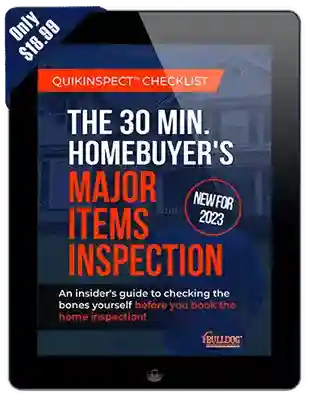
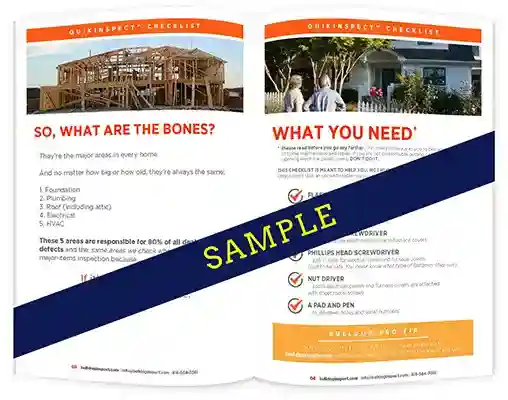
Created by a Certified Master Inspector™
13 Pages Fully Illustrated
Immediate PDF delivery + flipbook
Save time and hundreds – sometimes thousands – in wasted home inspection fees.
All in about 30 minutes
Use it over and over
Find out for yourself if there are MAJOR ISSUES hiding in plain sight before you call Blue Springs home inspectors.
Sample Home Inspection Reports
We only use 10key™ comments inside our premium home inspection reports.
These are explanations that use conversational language to answer the most important questions every report should ask if you want to understand the full scope of each issue and the impact is has on the home.
The premium home inspection report also includes enhanced photos to help you – and anyone else – take a closer look at the details.
Plus, your premium home inspection report includes safety, major, and maintenance summaries that help you put things in perspective.
Sample Premium Inspection Report of 6-Year-Old Home
Sample Premium Inspection Report of 60-Year-Old Home
Sample Premium Inspection Report of 115-Year-Old Home
This Homebuyer Shopped Around
Tyler was a no-nonsense first-time homebuyer who interviewed a few home inspectors before finally choosing us.
When it was over, we only asked him 3 questions:
1. What do you think about our service?
2. Which services did you order?
3. Would you recommend us to others?
This is what he said.
Frequently Asked Questions
When you’re NOT concerned about defects in other areas or the home is in REALLY rough condition.
Yes, always. As long as there is safe access and the pitch is not too steep (usually 8-12 or greater).
Good question. There are alot of differences, but too many to list here.
No.
Many real estate investors do not want a termite inspection, so it’s NOT included.
Not at all.
It takes years to master this craft.
Less experienced operators won’t have the same knowledge, experience, and intuition as someone who’s seen something a thousand times before.
This is important.
Your home is an engineering feat and you’re about to take full responsibility for it.
1. Have questions.
It’s best to ask before the inspection and again at the end.
2. Attend the inspection.
But try not to distract the inspector with chitchat. He’s trying to build a story that will help you buy the home. Feel free to observe, take measurements, jot down notes, and be there for the summary and discussion when it’s over.


